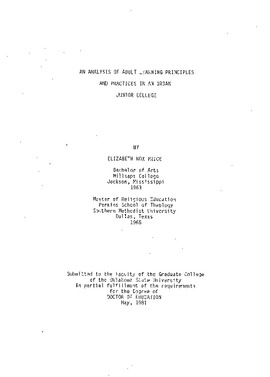| dc.contributor.advisor | Waynne, James | |
| dc.contributor.author | Price, Elizabeth Box | |
| dc.date.accessioned | 2015-11-09T22:39:12Z | |
| dc.date.available | 2015-11-09T22:39:12Z | |
| dc.date.issued | 1981-05 | |
| dc.identifier.uri | https://hdl.handle.net/11244/21478 | |
| dc.description.abstract | Scope and Method of Study: The purpose of this study was (1) to identify the basic principles of adult learning that underlie adult education programs as affirmed by authoritative sources and (2) to determine the extent these principles are being implemented by the full-time faculty in an urban community junior college program. Through a comprehensive literature review a research team of six individuals identified the Principles of Adult Learning. These Principles were validated by a jury of adult education leaders. From the validated Principles a questionnaire was developed to measure the extent of application of the Principles. The questionnaire was verified, checked for reliability, and then adapted for the several populations to be studied by the research team. The population of this study was composed of the full-time faculty of an urban junior college in the southwest. Out of 124 questionnaires distributed to the faculty, 78 were returned. From the data collected, descriptive statistics including means were computed to indicate the extent of use of each Principle as perceived by the faculty. The Principles were rank ordered by means, and the mean value of each Principle was presented according to different variables. | |
| dc.description.abstract | Findings and Conclusions: The results of the study indicated that there are nine basic Principles of Adult Learning and that the developed questionnaire is a potentially effective tool for analyzing practices in the community college setting related to application of the Principles. This study revealed that full-time faculty of an urban junior college perceived themselves as "frequently" implementing the majority of the Principles. This study also reported faculty perception of the extent of implementation of the Principles according to such factors as sex, age, faculty division, formal degrees, other academic settings, teaching experience outside the academic, and preparation for teaching the adult learner. | |
| dc.format | application/pdf | |
| dc.language | en_US | |
| dc.rights | Copyright is held by the author who has granted the Oklahoma State University Library the non-exclusive right to share this material in its institutional repository. Contact Digital Library Services at lib-dls@okstate.edu or 405-744-9161 for the permission policy on the use, reproduction or distribution of this material. | |
| dc.title | Analysis of adult learning principles and practices in an urban junior college | |
| dc.contributor.committeeMember | Adrian, William | |
| dc.contributor.committeeMember | Pearl, Joseph | |
| dc.contributor.committeeMember | Zucker, Jacob | |
| osu.filename | Thesis-1981D-P945a.pdf | |
| osu.accesstype | Open Access | |
| dc.type.genre | Dissertation | |
| dc.type.material | Text | |
| thesis.degree.discipline | Higher Education | |
| thesis.degree.grantor | Oklahoma State University | |
